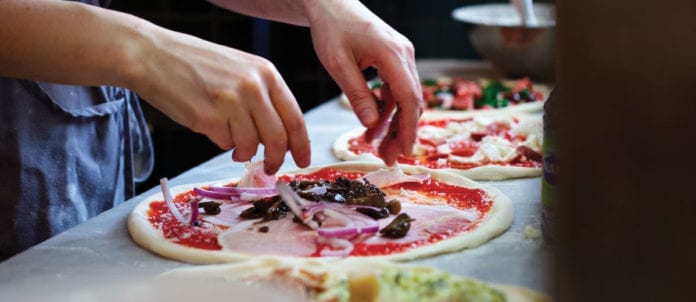Italian-inspired cuisine has been, and will continue to be, much loved by Canadians. But, while these foods still embody the principles of Italian cuisine — satisfying, fresh flavours with lots of soul — consumers are driving changes within the segment. Canadian diners are well-versed in food. They know the difference between sourdough and dry yeast and that using a certain type of flour for pizza dough will result in a different-textured crust.
They also know the environmental impact of mass-produced food and look instead for restaurants using locally sourced ingredients. For example, Technomic’s most recent (American-based) pizza consumer report states 44 per cent of North-American diners choose operators who use high-quality, freshly sourced toppings.
With the continued popularity of plant-based menus, pizza and pasta restaurants have embraced the possibilities. Virtuous Pie, with locations in Vancouver and Toronto, features artisanal nut-based cheeses and its Superfunghi pizza features truffle-almond ricotta, wild mushrooms, arugula, herbed potato cream and cashew mozzarella ($14 per 10-inch pizza).
Regional Favourites
Hyper-regional is the name of the game when it comes to standing out in this segment. For example, Descendant Pizza in Toronto focuses on Detroit-style pizzas — rectangular with a thick, crisp crust and dollops of sauce on top. In recent years, Detroit-style pizza has taken over in popularity from deep-dish Chicago-style or the more traditional Neapolitan-style pizzas. At Descendant, a large pepperoni pizza costs $29, while the more exotic Jaffna (featuring kothu roti, mango chutney, cilantro cream, green onion, Calabrian chili and coconut sambol) sells for $35.
Pizza Power
According to the American-based PMQ Pizza Magazine’s 2019 Pizza Power Report, while consumers continue to love pizza for its taste and the ability to customize their orders, they want the ordering process to be as simple as possible. Smartphone-friendly ordering apps are key, but some Canadian operators are taking technology to the next level in their operations.
At PizzaForno, which currently boasts 12 locations in the Greater Toronto Area, a combination of robotic-automation technology and artisanal methods promises hot, fresh pizza in three minutes from the time of ordering. Featuring a digitized menu of six pizzas (including three vegetarian options), PizzaForno limits the amount of face-to-face communication with customers, acting instead as a high-functioning pizza-vending machine.
Les Tomlin, president of PFX Canada Inc., says an opportunity to bring these revolutionary Adial pizza ovens — high-performing electric convection ovens designed specifically for the PizzaForno machine — to Canada inspired PizzaForno’s beginnings.
Upon securing the rights to Adial’s technology in North America (including Mexico), Tomlin and his partner, William Moyer, created the PizzaForno brand. They tested pizza recipes at two food festivals in Toronto during the summer of 2018 and opened their flagship location in downtown Toronto in December of that year.
While many diners will wait up to 30 minutes for a good-quality pizza, PizzaForno is shaking things up with the significant decrease in wait times.
“This aligns with consumer demand,” Tomlin explains. “QSR data indicates this segment is growing. Pizza is a staple in the North American diet, with 35 per cent of the population eating it once a week.”
Using robotic technology may sound unromantic, but each PizzaForno pizza is handmade by its pizza-makers with an authentic Italian approach. This includes a Roman-style crust, fresh and locally sourced toppings and quality cream and tomato sauces.
“The robotic technology allows us to deliver a fresh, never-frozen pizza in under three minutes,” Tomlin explains. “It also eliminates food waste, reduces labour costs and allows us to operate on a footprint of less than 70 sq. ft.”
Baking Outside the Box
Beer You Can Eat, based in Toronto, offers operators an inexpensive way to bring quality pizza options to their menus. The ready-to-roll pizza dough, made with quality ingredients, traditional techniques and beer, took time to perfect, according to owner/developer Dan O’Connor.
“I’ve been working on this since November 2017, but really, I’ve been making this pizza dough in my own home for 15 years,” he says. “I developed the recipe by incorporating French and Italian bread techniques into the dough itself. When I made it at home, I would cook it at in a regular oven at 425˚F and result in a restaurant-quality pizza crust. I flavoured it with beer because it enhances the gastronomic experience.”
The result, says O’Connor, is a product tailor-made for foodservice providers who are tight on space.
“The dough doesn’t take very long to cook,” he explains. “In fact, you’ll lose essential beer flavour if it cooks too long. In a pizza oven, it cooks [from frozen] in 2.5 minutes, while in a conventional oven it takes a mere six to seven minutes. That you can make a quality pizza in seven minutes in a 425˚F oven is so important, because most restaurants don’t have a pizza oven. With this dough, you don’t need a pizza oven to have pizza-oven quality.”
Beer You Can Eat uses no animal products, making it ideal for vegan-friendly menus.
“[I saw there was a] major gap in the foodservice market for wholesale pizza products,” O’Connor says. “As a dough, it’s very user-friendly and a time saver. It’s a light and tender dough, but it has a lot of structure — it won’t flop under toppings.”
Embracing the Pasta-bilities
In Montreal, television chef and restaurateur Stefano Faita, along with his business partner and fellow chef Michele Forgione, has been running several of the city’s most popular Italian-style restaurants for more than a decade. Impasto focuses on fresh, seasonal and local ingredients for its hearty Italian-inspired dishes.
“When we first opened [Impasto] we tried to go all over the place, constantly changing the menu,” Faita says. “After two years, we realized people were always coming back for certain dishes, [such as] Porchetta, ricotta gnocchi and homemade cold cuts. I’m really proud that, after all these years in business, we still make absolutely everything ourselves.”
The ricotta gnocchi is served in a hearty tomato sauce ($19) while the Porchetta comes with seasonal, fresh vegetables ($33). Impasto is considered a high-end restaurant, but Faita insists the heart of Italian cuisine is anything but fancy.
“At Impasto, we always told ourselves we were an Italian restaurant with Quebec products,” he continues. “We try to be as local as possible, aside from staples such as Parmigiano Reggiano, which has to come from Italy.”
In addition to Impasto, Faita and Forgione run Gema Pizzeria, Chez Tousignant and their newest addition, Vesta. Aside from Chez Tousignant, all are Italian-style eateries. Gema specializes in Neopolitan-style pizzas, while Vesta is a small, casual trattoria-style space with an American-Italian influenced menu.
“Gema is actually the first all-electric restaurant in Montreal,” Faita says. “We mimic a Neopolitan-style pizza in an electric deck oven. As a result, our dough ends up being a tad crispier; a little less elastic. Vesta is Italian-style with an American-Italian feel. We have Brooklyn-style pizzas, two pastas, classic appetizers such as Caesar salad and cheese sticks. It’s very family oriented.”
In recent years, Italian-style cuisine has been the domain of fine-dining restaurants, but according to Faita that’s changing — especially in the Montreal market.
“In Montreal, there’s a movement toward more casual eateries,” he remarks. “People enjoy the fact you can sit at a table, order all kinds of dishes and share everything.”
In the past, those with restrictive diets due to lactose intolerance or celiac disease were unable to enjoy cheese- and carb-laden Italian cuisine. But now, many Canadian chefs are creating delicious, hearty and satisfying plant-based pizzas and pastas and have added gluten-free options to their menus.
Touted as the first to bring Neopolitan-style, wood-fired pizza to Toronto in 1986, restaurant group Il Fornello is well-known for changing the foodservice game when it comes to Italian-Canadian cuisine. The brand was also one of the first Italian-style restaurants in the Greater Toronto Area to offer gluten-free and vegan options.
For Il Fornello’s vice-president Stacey Patterson, incorporating a plant-based menu into Il Fornello’s restaurants is all about being inclusive and hospitable.
“Despite being a fixture in the Toronto dining scene for 35 years, we’re now being discovered by a whole new group of diners,” she laughs. “Also, many of our regular customers are thrilled they can bring their vegan children to Il Fornello knowing there’s something on the menu for everyone. As a result, our reservations for groups have increased dramatically.”
Written by Janine Kennedy


















